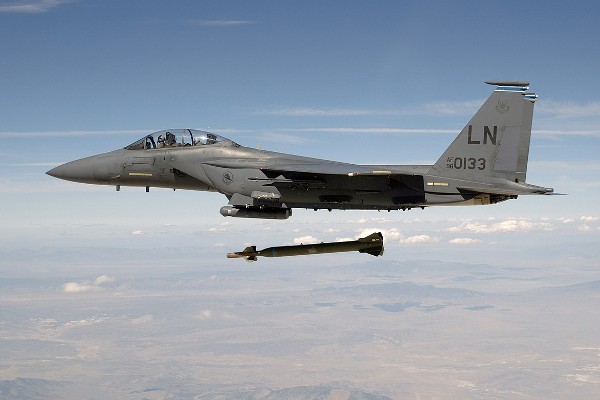The coalition used jets and Tomahawk missiles on Thursday to strike more than a dozen targets in Yemen
By Andrew Bernard, Menachem Wecker, JNS
U.S. and U.K. military forces, with Australian, Bahraini, Canadian, and Dutch support, struck “a number of targets” in Yemen associated with the Houthis, U.S. President Joe Biden announced on Thursday night.
“These strikes are in direct response to unprecedented Houthi attacks against international maritime vessels in the Red Sea, including the use of anti-ship ballistic missiles for the first time in history,” Biden said. “These attacks have endangered U.S. personnel, civilian mariners, and our partners, jeopardized trade, and threatened freedom of navigation.”
The Houthis—whom the Biden administration de-listed as a terrorist entity in 2021—have attacked ships from 50 countries and threatened or took hostages from 20 countries, according to Biden.
“More than 2,000 ships have been forced to divert thousands of miles to avoid the Red Sea, which can cause weeks of delays in product shipping times,” he said. “On Jan. 9, Houthis launched their largest attack to date—directly targeting American ships.”
The attack Thursday night is the first acknowledged U.S. airstrike in Yemen since 2020. Previous U.S. involvement in the country focused on combatting Al-Qaeda in the Arabian Peninsula, though Washington previously supported the Saudi-led military coalition backing the internationally-recognized government of Yemen against the Iranian-backed Houthi rebels that seized the capital Sanaa in 2014.
Biden announced that he was ending U.S. support to the Saudi-led coalition in 2021, saying that it would help bring an end to the conflict. While the Saudi conflict with the Houthis has in large part subsided, as the two sides engaged in peace negotiations, the Houthis’ diverse arsenal of missiles and rockets has enabled its latest spree of attacks and piracy in the Red Sea.
PBS has reported that the United States used jets and Tomahawk missiles on Thursday to strike more than a dozen targets in Yemen, including logistical hubs, air defense systems and weapons storage sites.
On Thursday night, U.S. Central Command wrote that the “multinational action targeted radar systems, air defense systems and storage and launch sites for one way attack unmanned aerial systems, cruise missiles and ballistic missiles.”
“We hold the Houthi militants and their destabilizing Iranian sponsors responsible for the illegal, indiscriminate and reckless attacks on international shipping that have impacted 55 nations so far, including endangering the lives of hundreds of mariners, including the United States,” said General Michael Erik Kurilla, CENTCOM commander. “Their illegal and dangerous actions will not be tolerated, and they will be held accountable.”
“Today’s defensive action follows this extensive diplomatic campaign and Houthi rebels’ escalating attacks against commercial vessels,” said Biden, citing many warnings from Washington and partners, and a U.N. Security Council resolution on Wednesday.
“These targeted strikes are a clear message that the United States and our partners will not tolerate attacks on our personnel or allow hostile actors to imperil freedom of navigation in one of the world’s most critical commercial routes,” he said. “I will not hesitate to direct further measures to protect our people and the free flow of international commerce as necessary.”
Responses in Congress
The strikes have already drawn criticism from the progressive flank of the Democratic Party. Rep. Ro Khanna (D-Calif.), who has been one of the leading opponents of U.S. arms sales to Saudi Arabia in the Yemen conflict, also questioned whether the strikes were constitutional.
“The president needs to come to Congress before launching a strike against the Houthis in Yemen and involving us in another Middle East conflict,” he wrote. “That is Article I of the Constitution. I will stand up for that regardless of whether a Democrat or Republican is in the White House.”
Sen. Roger Wicker (R-Miss.), the ranking Republican on the Senate Armed Services Committee, said he supports the strikes, which should have been carried out sooner.
“This strike was two months overdue, but it is a good first step toward restoring deterrence in the Red Sea,” he wrote. “This strike should be a warning to the Houthis and other Iranian proxies that they will suffer catastrophic consequences from escalation in the region.”
Earlier in the day, Vedant Patel, principal deputy spokesman at the U.S. State Department, said in the department’s daily press briefing that “about 30% of global container shipping passes through the Red Sea.”
“Of course, these kinds of actions are just going to put further burdens, add further uncertainty to global supply chains, to global economies, potentially even making it more burdensome to working families around the world,” Patel said. “Which is why the U.S. is continuing to, in close coordination, we’ll discuss with our regional partners about appropriate steps that can be taken.”



